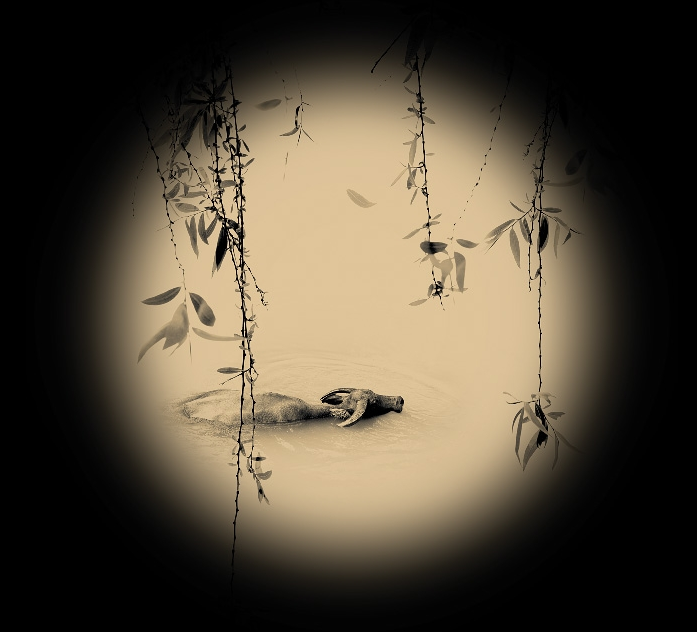How To Catch a Better Ox
|
The Buddha on Herding Oxen
From the Dhammapada Stories Commentary
This instruction was given by the Teacher while he was in residence at Alavi with reference to a certain lay disciple.
For one day, as the Teacher seated in the Perfumed Chamber at Jetavana surveyed the world at dawn, he beheld a certain poor man at Alavi. Perceiving that he possessed the faculties requisite for attaining the fruit of stream-entry, he surrounded himself with a company of five hundred monks and went to Alavi. The inhabitants of Alavi straightaway invited the Teacher to be their guest. That poor man also heard that the Teacher had arrived and made up his mind to go and hear the Teacher teach the Dhamma. But that very day an ox of his strayed off. So he considered within himself, "Shall I seek that ox, or shall I go and hear the Dhamma?" And he came to the following conclusion, "I will first seek that ox and then go and hear the Dhamma." Accordingly, early in the morning, he set out to seek his ox.
The residents of Alavi said provided seats for the Order of Monks presided over by the Buddha, served them with food, and after the meal took the Teacher's bowl, that he might pronounce the words of rejoicing. Said the Teacher, "He for whose sake I came here on a journey of thirty leagues has gone into the forest to seek his ox which was lost. I will not teach the Dhamma until he returns." And he remained silent.
While it was still day, that poor man found his ox and straightaway drove the ox back to the herd. Then he thought to himself, "Even if I can do nothing else, I will at least pay my respects to the Teacher." Accordingly, although he was oppressed with the pangs of hunger, he decided not to go home, but went quickly to the Teacher, and having paid obeisance to the Teacher, sat down respectfully on one side. When the poor man came and stood before the Teacher, the Teacher said to the steward of the alms, "Is there any food left over by the Order of Monks?" - "Reverend sir, it is all there." - "Well then, serve this poor man with food." So when the steward had provided that poor man with a seat in a place indicated by the Teacher, he served him dutifully with rice-porridge and other food, both hard and soft. When the poor man had eaten his meal he rinsed his mouth. (We are told that with this single exception there is no other instance on record in the Three Pitakas of the Tathagata's having thus inquired about the supply of food.)
As soon as the poor man's physical sufferings had been relieved his mind became tranquil. Then the Teacher taught the Dhamma in orderly sequence, expounding one after another the Four Noble Truths. At the conclusion of the lesson, the poor man was established in the fruit of stream-entry. Then the Teacher pronounced the words of thanksgiving, and having done so, arose from his seat and departed. The multitude accompanied him a little way and then turned back.
The monks who accompanied the Teacher were highly indignant and said, "Just consider, brethren, what the Teacher did. Nothing of the sort ever happened before. But today, seeing a certain poor man, the Teacher inquired about the supply of food and directed that food to be given to another." The Teacher turned around, stopped, and said, "Monks, what are you saying?" When he heard what they were saying, he said to them, "It is even so, monks. When I came here on a journey of thirty leagues, a long and difficult journey, my sole reason for coming was the fact that I saw that this lay disciple possessed the faculties requisite for the attainment of the fruit of stream-entry. Early in the morning, oppressed with the pangs of hunger, this man went to the forest and spent the day in the forest seeking his ox which was lost. Therefore I thought to myself, 'If I preach Dhamma to this man while he is suffering from the pangs of hunger, he will not be able to comprehend it.' Therefore I did what I did. Monks,
there is no affliction like the affliction of hunger." So saying, he pronounced the following stanza:
Hunger is the greatest disease,Conditioned things are the greatest suffering.For one who has known this as it isNibbana is the bliss supreme.
- Dhammapada 203
|



